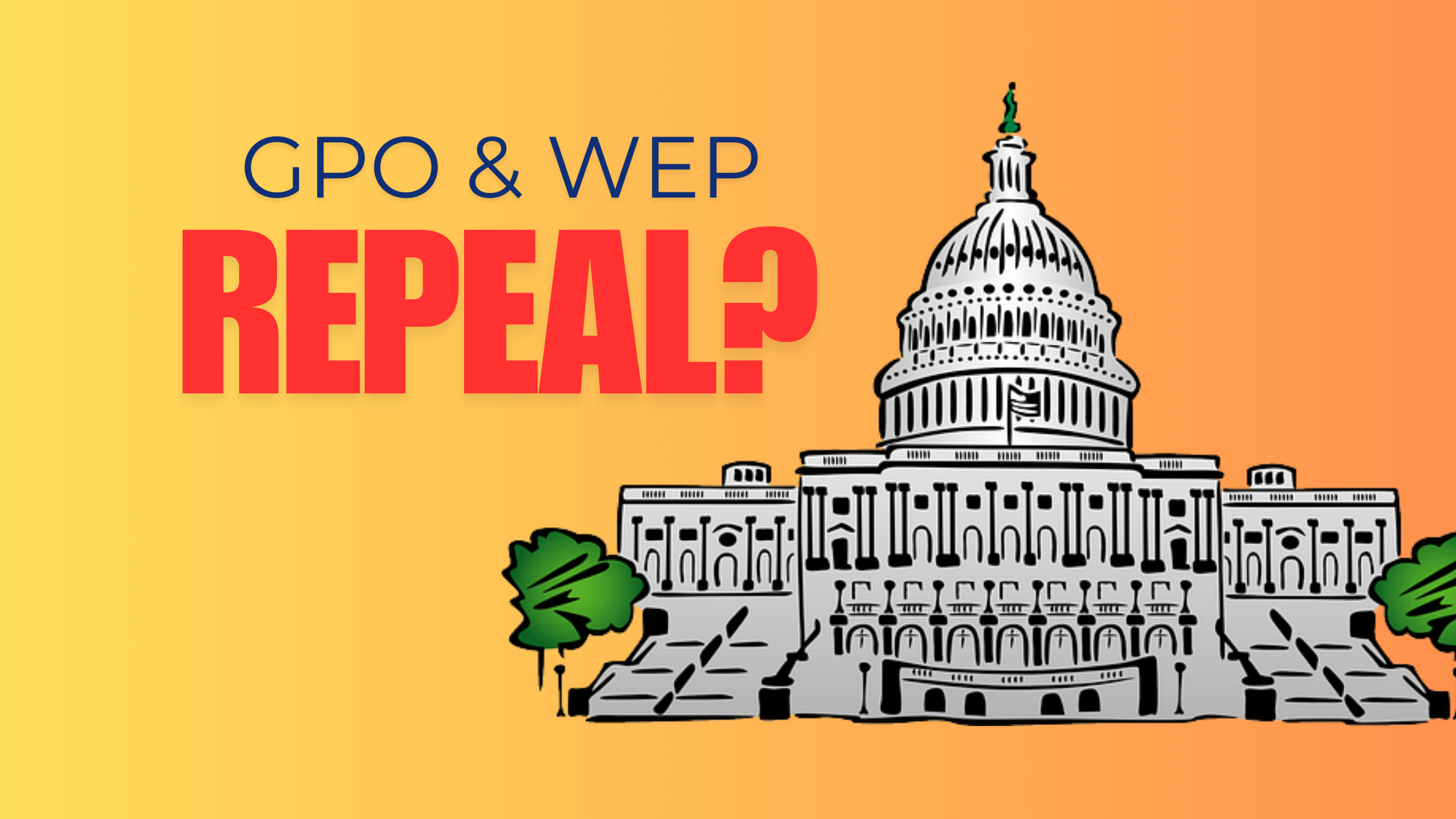The Social Security Fairness Act aims to repeal two policies, the WEP and GPO. After House of Representatives passes bill, how likely is a Senate vote?
U.S. House Advances Social Security Fairness Act (H.R. 82) to Address WEP and GPO
The U.S. House of Representatives recently passed the Social Security Fairness Act, a bipartisan legislative effort aimed at repealing the Government Pension Offset (GPO) and the Windfall Elimination Provision (WEP). These provisions have historically reduced Social Security benefits for individuals who receive pensions from state or local governments. For federal employees and retirees under the old CSRS system, these provisions have been of particular concern when planning their retirement from the government.
What is Likelihood of GPO WEP Repeal Bill Becoming Law?
Senate’s Role in Passing the Bill: Time is a Factor
Following the House’s approval, the bill must be considered and voted on by the Senate. Despite bipartisan support with 62 co-sponsors, which surpasses the majority needed for it to pass, the bill faces a tight timeline, as it must be voted on before the end of 2024, or it will expire. Senate leadership has yet to schedule a vote, and the packed legislative calendar makes it challenging. It is also unclear if the incoming Congress would take up the legislation again in 2025.
Public and Political Reactions to the Bill’s Progress
The progress of the bill has generated significant public and political reactions. Many retirees and advocacy groups have expressed support for the bill, including NARFE (the National Active and Retired Federal Employees Association), recognizing its potential to address the unfair social security provisions that have impacted their benefits. Political reactions have also been mixed. While there’s guarded optimism among advocates, the bill’s passage is not guaranteed. The cost of the bill, estimated at $196 billion over ten years, and concerns about its impact on Social Security’s solvency, create additional obstacles to its passage into law. To stay updated on the latest developments, you can review our WEP and GPO Repeal Bill news.
Knowledge is Confidence!
What Bipartisan Support Exists for the Social Security Fairness Act?
The act has garnered support from a bipartisan majority of the U.S. House of Representatives, with key lawmakers such as Abigail Spanberger (D-VA) and Garret Graves (R-LA) advocating for the bill. Bipartisan collaboration between lawmakers from different political backgrounds has helped to build momentum but there are still challenges to face in gaining Senate approval.
Financial Implications for the Government
Securing Senate approval will require continued bipartisan support and advocacy from lawmakers committed to repealing the WEP and GPO. The outcome of this legislative effort will have significant implications for retirees and the future of social security. Those opposed to repealing these provisions argue it would also have negative financial implications for the country’s budget. While the Social Security Fairness Act aims to provide fair treatment for retirees, it would also require adjustments to the social security system to accommodate the increased benefits. This change would necessitate careful consideration of the financial sustainability of the system, as well as potential reforms to ensure that social security can continue to provide support for future generations.
Why Repealing the WEP and GPO Matters
The proposed legislation seeks to repeal both WEP and the GPO, two provisions that have been criticized for unfairly reducing social security benefits. The GPO reduces retirement benefits for spouses, widows, and widowers who also receive government pensions. The GPO reduces spousal or survivor benefits by two-thirds of the government pension amount, often resulting in little to no social security benefits for the affected individuals. The WEP, on the other hand, affects those who worked in jobs not covered by Social Security but now receive a pension from those employers. The WEP can significantly reduce the social security income of some public sector employees and retirees, impacting their financial stability in retirement.
Impact on Social Security Benefits for Retirees
The repeal of WEP and GPO would have a profound impact on the social security benefits for retirees, particularly those who have served as government employees. Many retirees have seen their social security benefits significantly reduced due to these provisions, despite having paid into the system through other employment. Eliminating these offsets would ensure that retirees receive the benefits they are entitled to, providing them with greater financial security in their retirement years. This change would particularly benefit those who have dedicated their careers to public service, such as firefighters and educators.
How Do the WEP and GPO Impact Federal Retirees?
The Windfall Elimination Provision (WEP) is a formula used to adjust the social security benefits of individuals who also receive a pension from employment not covered by social security. This provision was originally intended to prevent individuals from receiving disproportionately high benefits, but it has been criticized for unfairly penalizing those who have worked in both covered and non-covered employment. CSRS-offset retirees in the Federal Government are in particular hurt by these reductions when it comes time to collect social security income or their pension. The GPO comes into play when both spouses are collecting a government pension in retirement and one of them. The rule only affects traditional CSRS pensions that didn’t pay into social security, not CSRS-offset or FERS retirees.
Effects on Firefighters and Other Government Employees
Firefighters and other government employees have been among the most affected by the WEP and GPO. These provisions have led to reduced social security benefits for individuals who have dedicated their lives to public service, despite having paid into the system through other employment. The financial impact of these offsets can be significant, leaving many retirees with less income than anticipated.
Reach Out to Us!
If you have additional federal benefit questions, contact our team of Chartered Federal Employee Benefits Consultants (ChFEBC℠), CERTIFIED FINANCIAL PLANNER™ (CFP®), and AIF® professionals. At PlanWell, we are federal employee financial advisors with a focus on retirement planning. Learn more about our process designed for the career fed.
Preparing for federal retirement? Check out our scheduled federal retirement workshops. Sign up for our no-cost federal retirement webinars. Make sure to plan ahead and reserve your seat for our FERS webinar, held every three weeks. Want to have PlanWell host a federal retirement seminar for your agency? Reach out, and we’ll collaborate with HR to arrange an on-site FERS seminar.
Want to fast-track your federal retirement plan? Skip the FERS webinar and schedule a one-on-one meeting with a ChFEBC℠ today.










